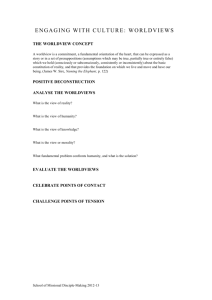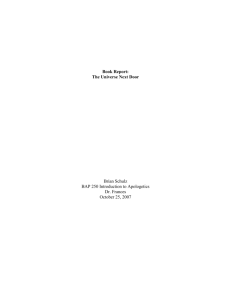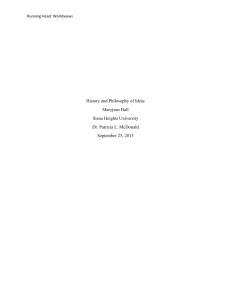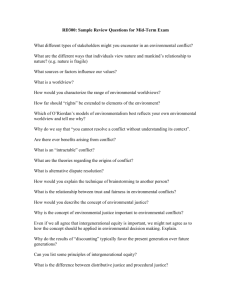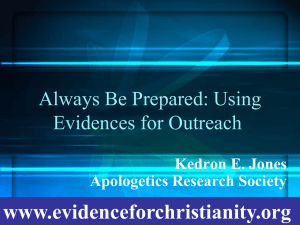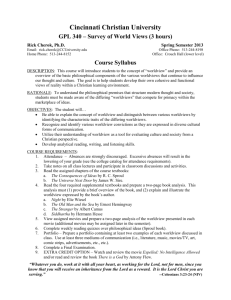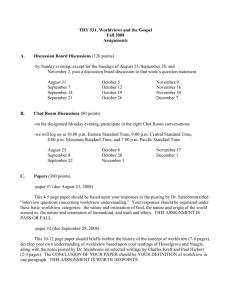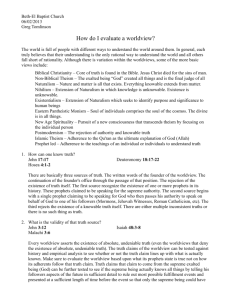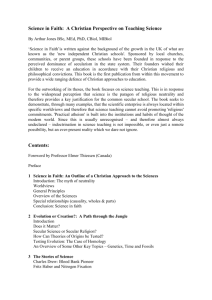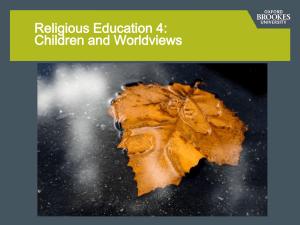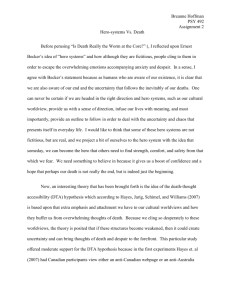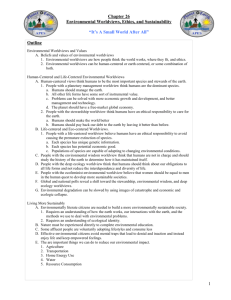Missouri Synod, is to prepare students for thoughtf
advertisement
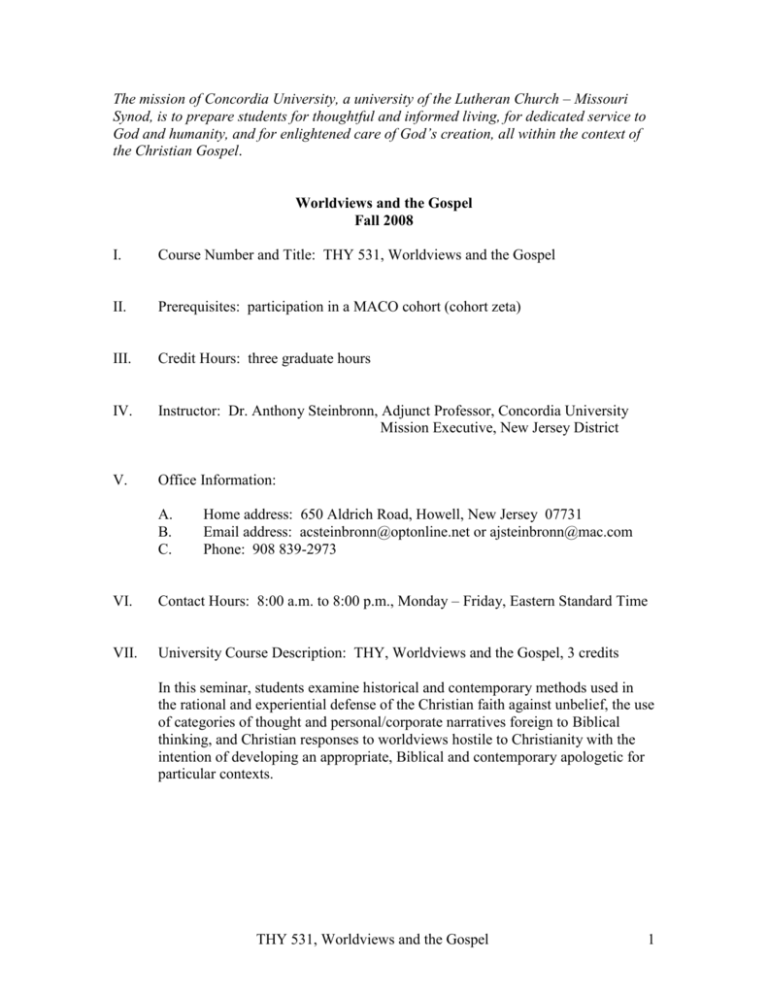
The mission of Concordia University, a university of the Lutheran Church – Missouri Synod, is to prepare students for thoughtful and informed living, for dedicated service to God and humanity, and for enlightened care of God’s creation, all within the context of the Christian Gospel. Worldviews and the Gospel Fall 2008 I. Course Number and Title: THY 531, Worldviews and the Gospel II. Prerequisites: participation in a MACO cohort (cohort zeta) III. Credit Hours: three graduate hours IV. Instructor: Dr. Anthony Steinbronn, Adjunct Professor, Concordia University Mission Executive, New Jersey District V. Office Information: A. B. C. Home address: 650 Aldrich Road, Howell, New Jersey 07731 Email address: acsteinbronn@optonline.net or ajsteinbronn@mac.com Phone: 908 839-2973 VI. Contact Hours: 8:00 a.m. to 8:00 p.m., Monday – Friday, Eastern Standard Time VII. University Course Description: THY, Worldviews and the Gospel, 3 credits In this seminar, students examine historical and contemporary methods used in the rational and experiential defense of the Christian faith against unbelief, the use of categories of thought and personal/corporate narratives foreign to Biblical thinking, and Christian responses to worldviews hostile to Christianity with the intention of developing an appropriate, Biblical and contemporary apologetic for particular contexts. THY 531, Worldviews and the Gospel 1 VIII. Instructional Goals and Objectives In the following areas students will demonstrate competence: A. Knowledge Objectives (cognitive formation) 1. 2. 3. 4. B. Attitude Objectives (affective formation) 1. 2. 3. C. Appreciation of the role of worldview in personal life and in Christian mission Humility in relating worldviews to the Gospel Joy in God’s good work in all cultures and worldviews Skill Objectives (conative formation) 1. 2. 3. IX. Comprehension of the concept of worldview Connection of worldview to other elements of culture Identification of worldview elements in various cultures Description of worldview elements in the light of Scripture and the Lutheran Confessions Articulating elements in one’s own worldview Recognizing elements in the worldviews of others Relating Gospel proclamation to elements of worldview Instructor’s Educational Philosophy The acquisition of data is only the beginning of learning. This data must be internalized and integrated, with meaningful application derived, toward the proclamation of the Gospel. At the graduate level, and particularly in cohort learning, student competence and contributions are expected and valued, both in collecting data and in exploring its significance. The instructor can be viewed as a learner with, and as a coach for, the students, sharing discovered learnings and supporting their work. It is understood, as with every learning opportunity, that there will be errors and trouble during the course and that forgiveness is the context for our work together. X. Teaching Procedures Student learning will come in a variety of forms. Common content will be acquired from readings and postings in WebCT. Students will also engage in conversation with people of differing worldviews. Electronic “conversation” on THY 531, Worldviews and the Gospel 2 these materials and other conversations will assist the cohort in continuing to develop as a learning community. XI. Attendance “Attendance” is a natural part of the life of an academic community, even an electronic one. Students contribute to one another’s learning by their participation and work. Therefore, students are expected to attend to the conversation and other tasks, providing resources to colleagues. Students are responsible for making up any and all missed work. XII. Classroom Atmosphere “Worldview” is a useful term for naming the reality of deeply held, seldom articulated by most, values and perceptions. Given the challenge of working with worldviews, then, deep personal respect is vital: respect for the views of instructor, for the views of other students in the course, for one’s own lifeviews, and for the views of those not taking the course. This respect will be evident in the quality given to papers and in personal engagement with the material. XIII. Required Textbooks A. The Book of Concord, any edition 1. The most recent English edition is edited by Kolb and Wengert, 2000. 2. The most common English edition to date was edited by Tappert, 1959. B. Hesselgrave, David J. Communicating Christ Cross-Culturally. Second Edition. Grand Rapids: Zondervan, 1991. ISBN 0-310-368111 C. Naugle, David K. Worldview: The History of a Concept. Grand Rapids: Eerdmans, 2002. ISBN 0-8028-4761-7 D. Steinbronn, Anthony J. Worldviews: A Christian Response to Religious Pluralism. St. Louis: Concordia, 2007. ISBN 0-7586-0598-6 THY 531, Worldviews and the Gospel 3 XIV. Basis for Student Grading A. Activities 1. Discussion board questions 120 points -twelve discussion board opportunities (see Assignments) 2. Chat room discussions 80 points -eight chat room conversations (see Assignments) 3. Paper #1 Pass/Fail -due August 23, 2008 4. Paper #2 100 points -due September 28, 2008 5. Paper #3 100 points -due November 2, 2008 6. Paper #4 100 points -due December 11, 2008 B. Grading Scale 1. 2. 3. 4. 5. XV. 450-500 points, A 400-449 points, B 350-399 points, C 300-349 points, D Below 300 points, F Course Outline: See Course Assignments and Calendar of Readings THY 531, Worldviews and the Gospel 4
